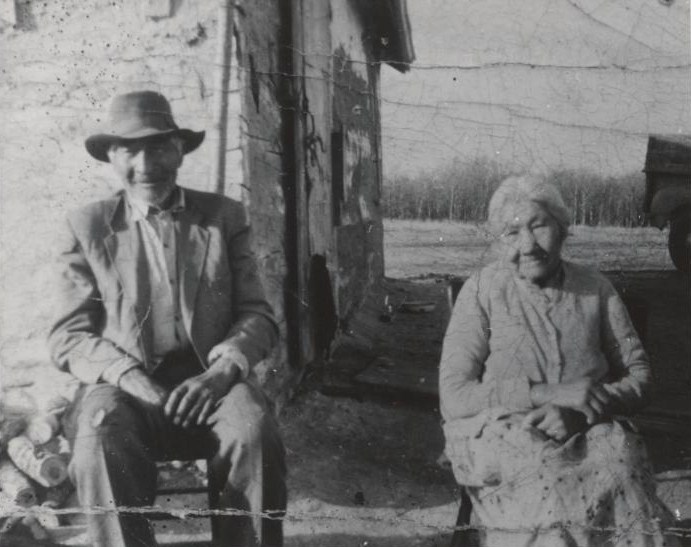Cultural Leaders
 |
|
In front of house Allen Sapp was born in. Maggie Soonias (Allens Mothers Mother) Photo Courtesy of the Allan Sapp Gallery |
Elders and Cultural Leaders
First Nations elders and cultural leaders are valuable resources in transmitting First Nations culture by sharing their knowledge and teachings through a holistic worldview. They are an integral part of our education system in relating Aboriginal history, perspectives, and experiences. Often elders and cultural leaders are called upon for their knowledge in certain areas like storytelling, ceremonies, songs and dance, governance, justice, traditional parenting and family units, positive lifestyles, spirituality, traditional plant usage, and cultural protocols to name a few. Elders and cultural leaders are known in their communities to assist in presenting valuable advice and are highly respected for their expertise and should be treated with respect following traditional protocols of the First Nations.
Elder
An elder is usually an older person and is defined by that within their communities amongst their peers, leadership, and community members. There is no age definition for an elder in First Nations communities but they usually have attained the role of an elder by their knowledge, vision, life experiences, leading positive lifestyles, their practices and traditions within their communities. Their knowledge is also seen as a gift from the Creator and has the purpose of sharing it with others. Their roles are important in promoting harmony, respect, spiritual guidance, and their ability to respond to their community in times of need. The journey in becoming an elder is extensive and requires merit and acceptance from their communities. Elders are highly regarded and should always be given respect in all circumstances and when you meet an elder you should always shake their hand as this shows respect for that elder.
Cultural Leaders
Cultural leaders are usually people who have not achieved the status of an elder, however, possess expertise in an area, and are often still learning their trade in becoming an elder. Nonetheless, they offer their knowledge in certain areas that are valuable to communities. For example, they may be a singer, a dancer, they bead, make traditional crafts, tan hides, a storyteller, and so forth. Cultural leaders are to be treated with the same respect as an elder because they are sharing their knowledge with society.
Seeking Knowledge from an Elder or Cultural Leader
There are certain protocols that need to be followed when you would like to gain knowledge or seek advice from an elder or cultural leader. These protocols are significant to follow and have been passed down for thousands of years and generations. It is important to know when seeking proper protocol advice, it is very important to remember that each Community’s belief system within the First Nations is different. Generally speaking when you would like to approach an elder or cultural leader, the direction to ensue is:
- When you meet and elder/cultural Leader shake their hand and introduce yourself.
- If you are seeking advice or want them to perform a task for you, then you offer them tobacco. Usually a pouch of tobacco or a pack of cigarettes. Tobacco is a sacred plant to the First Nations as it was given by the Creator for prayers and showing gratitude. When they are offered tobacco, they are in a solemn agreement with you to perform the task. If they cannot for some reason, they will let you know why, and advise you to another Elder who has expertise in the area you are asking of.
- Ask the elder or cultural leader what knowledge you seek from them. They will tell you any special instructions to be followed, as elders depending on their practices, have different ways of carrying out tasks.
- Generally you give them a gift like a blanket, an honorarium, or something that is valuable to you because they are sharing their knowledge with you.
- When they have accomplished what you asked them to do, you shake their hand again and thank them for their assistance.
Resource guide - Aboriginal Elders and Workers in Schools, published by Sask Learning is a guide for schools and school divisions.
Inviting Elders and Cultural Leaders to your Classroom
When teaching Aboriginal content in the classroom, it is ideal to have elders and cultural leaders assist in areas that are being taught for insight and clarification. Elders and cultural leaders are becoming more prominent in the schools and are a valuable resource to benefit and compliment a classroom. It is important to relate to students in the classroom, the role of elders and cultural leaders and how they must be treated when they come into a classroom. Some general guidelines to inform students of:
- To shake their hand as a sign of respect upon their arrival.
- To listen attentively until completion of visit.
- To put up hands to ask a question or when the elder and/or cultural Leader indicates when it’s an ideal time to ask questions.
- To thank them and shake their hand upon closure of their visit.
Schools can refer to Living Histories Cultural Directory for a list of elders, artists and knowledge keepers from our area. It is important to note that list is ever growing and is not meant to be exclusive. It is important to build positive relations with nearby First Nations communities as all will benefit from sharing with one another, an important Treaty principle. The Office of the Treaty Commissioner also has a speaker’s bureau accessible for Educators to utilize in the classroom on subject areas.